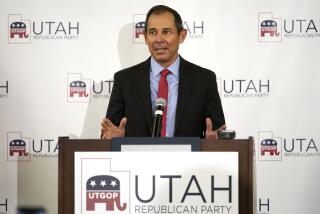The greening of faith
It has long been a maxim that mixing religion and politics can spell trouble. So when Rick Santorum told a partisan crowd in Columbus, Ohio, recently that President Obama’s worldview was based on a “phony theology” that drives “radical environmentalists,” he must have known his comments would reverberate far beyond his conservative political base.
Santorum was speaking of efforts to forestall the worst effects of climate change through controls on greenhouse gas emissions from fossil fuels, and policies aimed at encouraging the development of renewable sources of energy. Obama, he said, was putting the Earth before the needs of humans. “It’s about some phony ideal, some phony theology.” That theology, he said, was not “based on the Bible.” At another point, he rejected as unproven the findings of the vast majority of the world’s reputable scientists that humans are accelerating climate change. Climate change, he claimed, is not about “climate science” but “political science.”
Santorum can’t be blamed for wanting to throw a little red meat to conservatives as he seeks to maintain his momentum in the race for the Republican presidential nomination. But he is as wrong on his theology as he is on the science.
Certainly there are people of faith who don’t consider environmentalism a part of their religion. But there are also many environmentalists who see their activism as deeply rooted in Scripture and faith traditions. Threats to the natural world at times implicitly involve issues with which religion has long grappled, among them materialism, social and economic justice, and love of God and neighbor. Indeed, it is not a little ironic that Santorum, a devout Roman Catholic, is at odds with Pope Benedict XVI and the nation’s Roman Catholic bishops who view climate change with alarm. They have repeatedly called on the government to address it as a matter of prudence, and to aid poor nations and people who are least responsible for climate change and least able to cope with its consequences.
“At its core, global climate change is not about economic theory or political platforms, nor about partisan advantage or interest group pressures,” the U.S. bishops wrote. “It is about the future of God’s creation and the one human family. It is about protecting both ‘the human environment’ and the natural environment. It is about our human stewardship of God’s creation and our responsibility to those who come after us.”
The Catholic Church is not alone in this view. Many mainline Protestant groups, Eastern Orthodoxy and various streams of Judaism are also actively engaged in conservation issues. Eastern Orthodoxy’s Ecumenical Patriarch Bartholomew has called environmental abuse a “sin.” And cliches about evangelicals to the contrary, many are making “creation care,” as they call it, a moral imperative.
A group of evangelical Protestants worked successfully to oppose the watering down of the U.S. Endangered Species Act, and mounted a headline-catching campaign several years ago for higher-mileage cars by asking, “What Would Jesus Drive?” In West Virginia, where coal mining is a major employer and the bedrock of the state’s economy, religious folk have called for new regulations to protect streams and hollows from mountaintop coal mining. In Texas, where big oil ordinarily reigns supreme, congregants have campaigned for greenhouse gas reductions from the state’s refineries.
In the halls of Congress and state legislatures, “faith-full” environmentalists are talking to lawmakers about the moral implications of environmental damage. Rabbis have mounted a campaign to save the California redwoods, and just last week the Coalition on the Environment and Jewish Life embarked on a national campaign to cut energy use within the Jewish community by 14% in the next two years.
That is not to say, of course, that all church- and synagogue-goers are moved by their faith to take environmental action. In 2010, the Pew Forum on Religion and Public Life found that, while solid majorities in all major religious traditions favor stronger environmental laws and regulation, only 6% of religious Americans said their faith was the biggest influence in their support for tougher regulations.
And taking up the environmental cause has occasionally been controversial within American evangelicalism. Religious conservatives have argued that the greening of faith could divert attention from “the great moral issues of the day,” which they identified as abortion, gay marriage and the teaching of sexual abstinence. But they may have already lost that battle. A Pew poll last year found that 36% of evangelicals say that working to protect the environment is essential to being a good evangelical.
The greening of faith is not about turning churches into branches of the Sierra Club or about requiring people of faith to be partisan. It is about applying religious beliefs in a world confronted by unprecedented threats to the created order. Phony theology has nothing to do with it.
Larry B. Stammer is a former Times religion writer and the author of an upcoming book on the intersection of religion and the environment.
More to Read
A cure for the common opinion
Get thought-provoking perspectives with our weekly newsletter.
You may occasionally receive promotional content from the Los Angeles Times.






